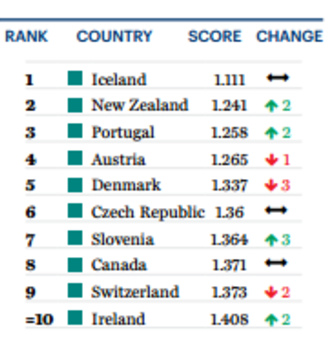These are the most peaceful countries in the world

Iceland has retained its place at the top of the index since 2008. Image: REUTERS/Bob Strong

Get involved with our crowdsourced digital platform to deliver impact at scale
Stay up to date:
Global Governance
Despite brutal and protracted conflicts raging in the Middle East, the world has become slightly more peaceful in the past year.
The Global Peace Index ranks 163 countries according to their domestic and international conflicts, safety and security and degree of militarization. It found 93 had improved, while 68 had deteriorated, and overall peace levels had inched up 0.28%.
However, against a backdrop of increased civil unrest and terrorism, the longer-term picture is more gloomy.
The report, produced by Australian think-tank the Institute for Economics and Peace, found a 2.14% decline in peacefulness over the 10-year period since 2008. And the gap between the most and least peaceful countries continues to widen.
The most and least peaceful countries
The most peaceful country in the world is Iceland, which has retained its place at the top of the index since 2008. The other nations in the top five are New Zealand, Portugal, Austria and Denmark.

There was little change in the scores of the most war-torn countries, with Syria remaining the least peaceful, followed by Afghanistan, Iraq, South Sudan and Yemen.

Six of the index’s nine geographical regions recorded improvements, which led to the first increase in global peace levels since 2014.
The biggest regional deterioration was seen in North America. This was largely as a result of the polarizing US presidential election.
Although the period of the report excludes recent terrorist attacks in Europe, notably in the UK and France, Europe remains the most peaceful region in the world.

The cost of violence and conflict
The report noted that the economic impact of violence on the global economy was $14.3 trillion in purchasing power parity terms – equivalent to 12.6% of the world’s GDP.
Meanwhile, war cost the global economy $1.04 trillion. The report also points out that peacebuilding expenditure is an estimated $10 billion, or less than 1% of the cost of war.
Don't miss any update on this topic
Create a free account and access your personalized content collection with our latest publications and analyses.
License and Republishing
World Economic Forum articles may be republished in accordance with the Creative Commons Attribution-NonCommercial-NoDerivatives 4.0 International Public License, and in accordance with our Terms of Use.
The views expressed in this article are those of the author alone and not the World Economic Forum.
Related topics:
The Agenda Weekly
A weekly update of the most important issues driving the global agenda
You can unsubscribe at any time using the link in our emails. For more details, review our privacy policy.
More on Global GovernanceSee all
Efrem Garlando
April 16, 2024
Liam Coleman
March 7, 2024
David Elliott
March 1, 2024
Selina Hänni and Micol Lucchi
January 17, 2024
Luc Triangle
January 15, 2024
Anna Marks
January 11, 2024






